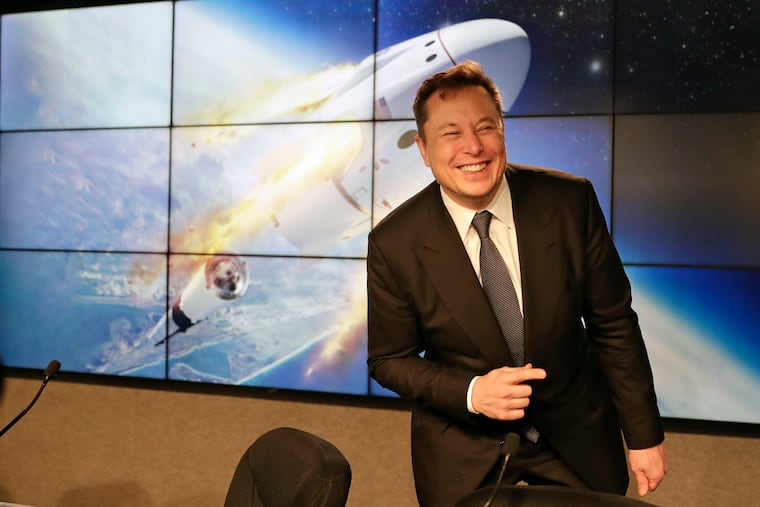The earthly realities of tying space exploration to the mercurial whims of billionaires | Editorial
So much has been invested in America’s new entrepreneurship approach to boldly go where we’ve never been that it’s unlikely NASA will ever again be our sole pilot.

Elon Musk’s decision to move SpaceX headquarters to Texas because he disagrees with a new California law that prohibits schools from informing parents when an LGBTQ child changes their name or pronouns is an embarrassing consequence to letting private companies take the lead in America’s space exploration efforts.
Musk’s transgender daughter applied for a new birth certificate when she turned 18 in 2022, saying, “I no longer live with or wish to be related to my biological father in any way, shape or form.” Musk blames his daughter’s disapproval of him on the California schools she had attended. So, he plans to not only move SpaceX to Texas but also X (formerly Twitter) to protest the new LGBTQ law signed by California Gov. Gavin Newsom.
Musk isn’t the only space entrepreneur making controversial moves.
Amazon owner Jeff Bezos said he is changing his residence from Washington state to Florida to be closer to his Blue Origin space company. But he didn’t mention the estimated $600 million in capital gains taxes he will avoid paying by moving from Seattle to Miami before a planned sale of 50 million shares of his Amazon stock.
It should be mentioned that long before billionaires started building rocket ships, some aerospace decisions were similarly stained by the political moves of vote-seeking members of Congress trying to keep jobs in their states. Sen. Tommy Tuberville (R., Ala.) threw a fit last year when President Joe Biden rescinded former President Donald Trump’s decision to move the new Space Command headquarters from Colorado to Alabama.
The mercurial whims of the superrich have made the course of space exploration even harder to predict. But so much has been invested in America’s new entrepreneurship approach to boldly go where we’ve never been that it’s unlikely NASA will ever again be our sole pilot.
Congress barely blinked an eye this year when it cut the space agency’s budget by 2% to $24.8 billion. Biden had asked for a 7% increase but taxpayers barely paid attention. Not even TV fans of popular space dramas like Star Trek: Strange New Worlds and For All Mankind have been keeping up with the tediously tiny steps toward a galactic mission being made by NASA, SpaceX, and Blue Origin.
Polls show Americans are more concerned about space debris falling to the earth than going to Mars. They do notice when the space flight companies experience another launch failure. But that’s likely because each botched test is a reminder of the doomed feelings Americans experienced when the Apollo 1, Columbia, and Challenger disasters left 17 astronauts dead.
Enthusiasm for space flight also took a blow after the shuttle program was shut down in 2011 and our astronauts started hitching rides aboard Russian spacecrafts. Tepid support for space exploration won’t get better until the private companies that one day may supplant NASA achieve a measure of success that rivals this nation’s first manned flights beyond the Earth’s atmosphere.
It doesn’t help boost public support when Musk suggests his moving SpaceX out of California has as much to do with that state’s new LGBTQ law than the Lone Star State’s business-friendlier tax system. Musk is building an entire town 23 miles from Brownsville, Texas, including a $100 million, five-story office building. But will he move again if one day he similarly objects to how Texas politicians run their state? Costs seem to mean nothing to him.
NASA’s contract with SpaceX is mostly boilerplate text defining a relationship in which the company won’t be hampered by rules that might impede its ability to operate as a completely independent entity and not a government contractor. In return, space entrepreneurs such as Musk, Bezos, and Richard Branson, who owns Virgin Galactic, are supposed to do what NASA is perceived as being incapable of doing without them: land a human-occupied spacecraft on Mars.
Confidence in the entrepreneurs’ ability to do that is lost when they seem more concerned with prospecting for tax breaks or using their space exploration companies as props to make personal political statements about social issues that have nothing to do with building a rocket ship that can safely take a person 140 million miles away to the Red Planet.